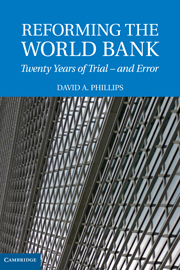Crossref Citations
This Book has been
cited by the following publications. This list is generated based on data provided by Crossref.
Davis, Zachary
2009.
Commons.
Environment, Space, Place,
Vol. 1,
Issue. 2,
p.
103.
2011.
An Introduction to International Economics.
p.
413.
Vestergaard, Jakob
and
Wade, Robert H.
2015.
Still in the Woods: Gridlock in the IMF and the World Bank Puts Multilateralism at Risk.
Global Policy,
Vol. 6,
Issue. 1,
p.
1.
Whittle, Dennis B.
2016.
Broken Pumps and Promises.
p.
31.
Heldt, Eugénia C.
2018.
Lost in internal evaluation? Accountability and insulation at the World Bank.
Contemporary Politics,
Vol. 24,
Issue. 5,
p.
568.
Bazbauers, Adrian Robert
2018.
The World Bank and Transferring Development.
p.
57.
Viterbo, Annamaria
2018.
The Duty of Care of International Organizations Towards Their Civilian Personnel.
p.
357.
Heldt, Eugénia C.
and
Schmidtke, Henning
2019.
Explaining coherence in international regime complexes: How the World Bank shapes the field of multilateral development finance.
Review of International Political Economy,
Vol. 26,
Issue. 6,
p.
1160.
Soriani, Stefano
and
Mazzaferro, Pietro
2019.
Caratteristiche, evoluzione e rilevanza geo-economica degli aiuti giapponesi in Cina (1979-2008). Quadro generale e analisi dei casi di Dalian e Shanghai.
RIVISTA GEOGRAFICA ITALIANA,
p.
21.
Harper-Shipman, T. D.
2019.
How comprehensive is comprehensive? Using Wangari Maathai as a critique of the World Bank’s contemporary development model.
Third World Quarterly,
Vol. 40,
Issue. 4,
p.
633.
Sondarjee, Maïka
2021.
Change and stability at the World Bank: inclusive practices and neoliberal technocratic rationality.
Third World Quarterly,
Vol. 42,
Issue. 2,
p.
348.
Grohs, Stephan
and
Rasch, Daniel
2021.
Administrative convergence in the United Nations system? Patterns of administrative reform in four United Nations organizations over time.
International Review of Administrative Sciences,
Vol. 87,
Issue. 4,
p.
755.
Sondarjee, Maïka
2021.
Collective Learning at the Boundaries of Communities of Practice: Inclusive Policymaking at the World Bank.
Global Society,
Vol. 35,
Issue. 3,
p.
307.
Vargas-Hernandez, José G.
and
Vargas-González, Omar C.
2023.
Using Organizational Culture to Resolve Business Challenges.
p.
35.
Soremi, Titilayo
2023.
New directions in conditional policy transfer to sub-Saharan Africa: the case of renewable energy policy transfer to ECOWAS by the EU.
Canadian Journal of African Studies / Revue canadienne des études africaines,
Vol. 57,
Issue. 2,
p.
327.
Sondarjee, Maïka
2024.
Practice Contestation in and between Communities of Practice: From Top-Down to Inclusive Policymaking at the World Bank.
Global Studies Quarterly,
Vol. 4,
Issue. 1,





